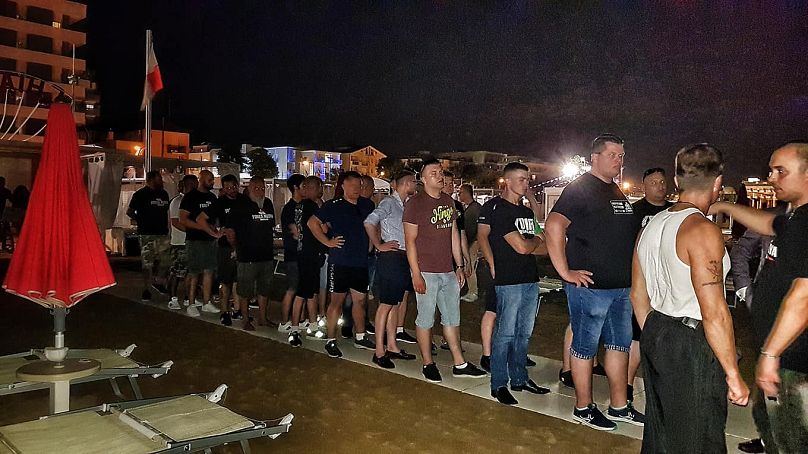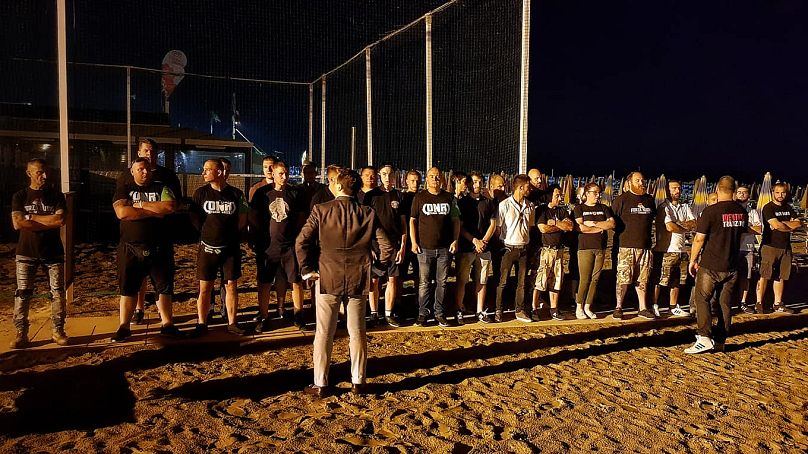The landmark meeting of the two groups in Italy has sparked concerns from anti-fascists. But was it just a publicity stunt?
Italy’s far-right party Forza Nuova (FN) and Poland’s National Radical Camp (ONR) have joined forces for what they call “the first European security operation” on the beaches of the Italian Romagna Riviera.
The two groups met last week in the city of Rimini for a conference, street demonstrations and “patrols” of the beach where a Polish tourist and a Peruvian transgender woman were raped last summer.
The meeting of the two ultra-right-wing groups has sparked concern in Italy.
Giusi Delvecchio, president of the National Association of Italian Partisans (ANPI) - a group founded in the 1940s by participants of the resistance against the Italian Fascist regime - told Euronews that concerns centred largely around the involvement of a foreign extremist group.
"We are worried not so much about Forza Nuova, but because this time there are people coming from abroad to our territory,” Delvecchio explained.
“We don't know who they are. We are worried by those who come from outside, take action and then leave.”
Who are ONR and why were they in Italy?
Both ONR and FN are part of the Alliance for Peace and Freedom, a European group chaired by FN’s leader Roberto Fiore and whose members include the likes of Greece’s Golden Dawn and the National Democratic Party of Germany.
The ONR movement is one of three ultra-nationalist groups behind the Independence March that takes place in Warsaw every November.
In 2017, leading far-right groups and figures from across Europe took part in the march, including Hungary’s Jobbik party, England’s Tommy Robinson, Spain’s Democracia Nacional and FN’s Fiore.
Daniel Tilles, a journalist from the Notes of Poland news site, said the event is presented as being “patriotic” rather than far-right.
“Most people [attending] don’t support them but these events give them a platform to promote themselves,” he explained.
Tilles said the ONR exists legally but has its roots in the anti-Semitic groups of the 1930s.
“In the last few years they tried to clean up their image a bit. Fifteen years ago they were still doing the fascist salute but now they are trying to appear more respectable, don't use mimetic outfits anymore, don't do the fascist salute, criticise Israel instead of jews and they are anti-muslim,” he said.
Michal Jelonek, who deals with media relations for ONR, said around 50 members of the group went to Italy for the meeting after being invited by Fiore.
“He came in the winter to invite us. The action is called ‘operation security’. It will be organised in the future more to protect the beaches,” he said.
Publicity stunt?
Delvecchio said he believed the recent activities of the group were largely a publicity stunt.
“They shut themselves in a hotel and sneak out to take photos in moments when they're not seen by anyone and then launch them on Facebook as propaganda,” he said.
Mirco Ottaviani a regional coordinator for Forza Nuova, admitted to Euronews that the meeting had generated a “nice media fuss”.
He described the event as “a symbolic initiative in a limited time span", adding that the so-called beach patrols had been misrepresented and were actually “walks for safety”.
He noted that far from an isolated event, the two groups had further action planned throughout the summer.
“The union [with ONR] is getting stronger and stronger in the East, where we have been enjoying great success lately. There is a European change taking place,” he said.
Are these ‘security operations’ legal?
Enzo Balboni, professor of Constitutional Law at Italy’s Catholic University, said "security, public order and the fight against crime can not be delegated outside the organs of the state and the police.”
“Any action that aims to combat crime is not legal or legitimate, let alone with the use of weapons or undertaken with some distinctive elements such as uniforms,” he explained.
Balboni said if the groups had attempted to handcuff someone or had intimidated people, they could have faced legal action.
“But it seems to me more a great propaganda operation. It is the way in which politics is done today,” he said.













